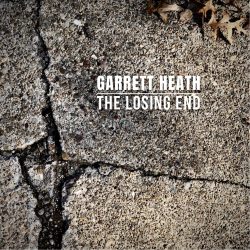Documenting the decline of a nation, while trying to capture its beauty. A tough task that Heath is equal to.
 ‘The Losing End’ “features a collection of stories from Heath’s own patchwork of rural rust-belt America, spanning over five decades.” There’s more than a touch of Springsteen about most of the music here, but Heath makes the style his own with a voice that doesn’t try to reflect The Boss.
‘The Losing End’ “features a collection of stories from Heath’s own patchwork of rural rust-belt America, spanning over five decades.” There’s more than a touch of Springsteen about most of the music here, but Heath makes the style his own with a voice that doesn’t try to reflect The Boss.
The standout song of the early part of the album is a cover of John Hartford’s ‘In Tall Buildings.’ Picked to provide a contrast with his own lyrics that “are dealing with the darker side of rural America,” it also has a slightly livelier country feel to the tune than the two songs that go before it. Opener ‘West Front St’ sets a downbeat tone that the much better ‘Live for the Moment’ struggles to lift. The Dylan/Springsteen harmonica that is rather overused across the album and tends to make the music sound less than it is. The guitar and organ parts could have carried several of the songs on their own and may have shown a different texture to the tunes that might have lifted the mood.
Heath is fond of quoting Dostoevsky’s maxim that “beauty will save the world.” The point at which this album falls is in failing to take that onboard himself. Often the tone is unremittingly pessimistic, making it hard to find the beauty in the music. The title song encapsulates all Heath’s strengths and weaknesses in the one song. The fragility of his voice which nearly cracks in getting his message across, contrasts with the ever-present themes of “economic decline, loss of opportunity, and socio-political abandonment.”
He leaves the best two songs until last ‘Camaro’ is a story of driving home from his job at Walmart. Having that job and driving a Camaro come across as victories in the struggle to build a life. Closing song ‘Vanity’ tells us “The truth is I am nothing, but the truth will set me free.” Again, he embraces the condition of post-industrial rust belt America. The optimism of these two songs sits in contrast to the earlier material and lift the whole album from a rant against an unfair world into a place where he sees hope for the future.
Heath has a message to deliver, and he does it effectively, and he may not be too bothered if it doesn’t speak to people outside the communities he is writing about. This would be a shame as the bleak beauty of rural America that he is trying to show us is present in these songs ‘The Losing End’ is a good album, and worth the time to dig into its appeal. Just don’t expect an easy or quick trip to appreciating it.


